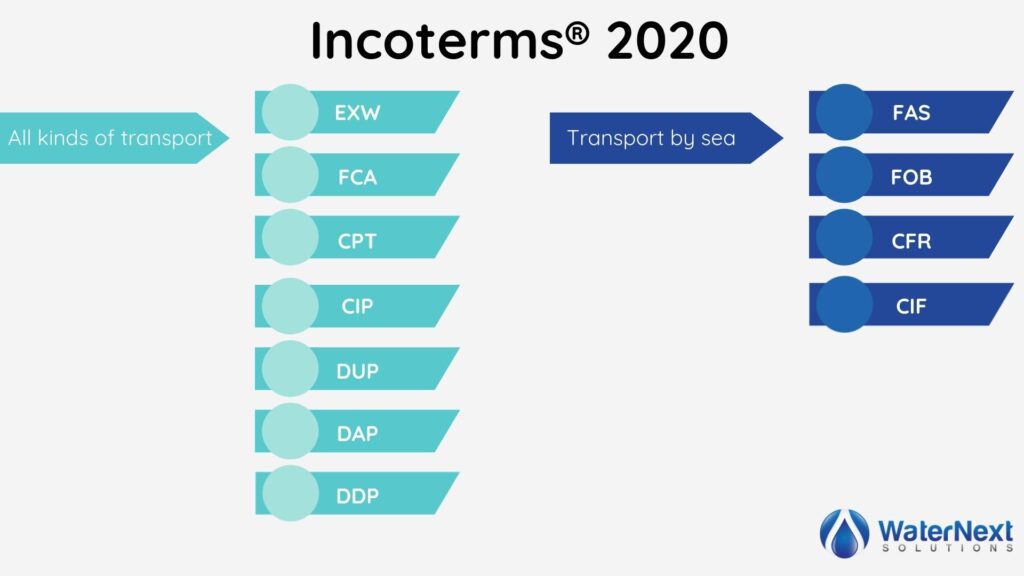WHAT ARE INCOTERMS®?
Incoterms® (International Commercial Terms) are standardized rules created by the International Chamber of Commerce (ICC) to define delivery terms, liability and costs in international trade. These terms, first introduced in 1936, are revised periodically, with the latest version dating from 2020.

Thanks to Incoterms®, sellers and buyers can clearly establishing who is in charge of what during the shipping process, from the point of origin to the final destination, optimizing business operations.
WHY ARE INCOTERMS® IMPORTANT?
Incoterms® regulate:
📍Responsibilities: they define who is in charge of each stage of the shipment;
📍Costs: define who pays for transport, insurance and customs clearance;
📍Risks: identify when risks pass from the seller to the buyer.
THE INCOTERMS® CATEGORIES
Incoterms® 2020 are divided into two main categories:
1. Terms for any type of transport
Designed for all modes of transport, including multimodal shipments:
🌍 EXW (Ex Works): the seller makes the goods available at its premises and the buyer takes care of the rest;
🌍 FCA (Free Carrier): the seller delivers the goods to the carrier designated by the buyer;
🌍 CPT (Carriage Paid To): the seller in this case takes care of the carriage to an agreed location;
🌍 CIP (Carriage and Insurance Paid To): this Incoterms® is similar to CPT, but the seller also provides insurance cover;
🌍 DAP (Delivered At Place): the seller delivers the goods ready for unloading;
🌍 DPU (Delivered At Place Unloaded): the seller also unloads the goods;
🌍 DDP (Delivered Duty Paid): the seller bears all costs and risks, including customs clearance at import.
2. Terms for carriage by sea
These terms are specific to sea shipments:
🌊 FAS (Free Alongside Ship): the seller delivers the goods alongside the ship designated by the buyer;
🌊 FOB (Free On Board): the seller delivers the goods on board the ship;
🌊 CFR (Cost and Freight): the seller pays for the carriage to the port of destination;
🌊 CIF (Cost, Insurance and Freight): like CFR, but here a minimum insurance is also included.

NEW FEATURES OF INCOTERMS® 2020
The 2020 edition has introduced some relevant changes to meet the evolving needs of international trade:
🌍 Introduction of DPU: the term DPU (Delivered At Place Unloaded) replaces DAT (Delivered At Terminal), emphasizing that the place of delivery does not have to be a terminal;
🌍 Bill of Lading with ‘on board’ annotation in FCA: to facilitate documentary credit operations;
🌍 Increased insurance cover in CIP: a policy in accordance with Institute Cargo Clauses (A) is required, covering all risks;
🌍 Transport by own means: there is the possibility to organize transport without the use of third party carriers for FCA, DAP, DPU and DDP;
🌍 Clearer structure: the costs to be borne by the parties are listed in detail in the new Articles A9/B9.
KEY ADVANTAGES OF INCOTERMS® 2020
Incoterms® 2020 offer:
📍Greater Transparency: they clearly define roles and responsibilities;
📍Risk Reduction: they minimize disputes and misunderstandings;
📍Cost Optimization: they give the possibility to better plan expenses.
CONCLUSION
Incoterms® 2020 are a fundamental tool for anyone involved in international trade. Understanding them and applying them correctly simplifies transactions, improves collaboration between parties and minimizes risks and costs.

Comments are closed